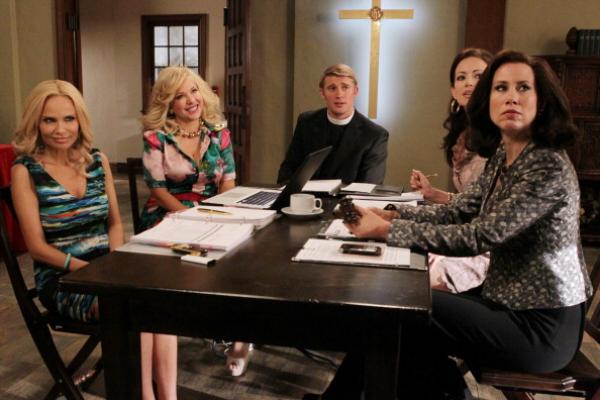Many TV network executives, advertisers and producers would sell their souls to get the kind of audience God has. But giving religion a starring role in prime time? Not so much.
Religion, God and spirituality have made cameos across the dial from "The Sopranos" to "The Simpsons" -- though usually as a prop or walk-on role. But shows where religion is a central part of the premise are rare, and the ratings are generally far from heavenly.
Short of touchy-feely shows like "Touched By an Angel" or "Highway to Heaven," why is religion so radioactive in Hollywood?
This month, cable network TLC canceled "All-American Muslim" after only about 700,000 viewers watched the season finale of the reality show featuring Muslims in Dearborn, Mich.
Meanwhile, ABC's saucy new drama "GCB" -- think "Desperate Housewives" in choir robes -- that's based on Kim Gatlin's novel "Good Christian Bitches" has been panned by critics and called "anti-Christian" by Newt Gingrich. The "GCB" premiere on March 4 lost the coveted 18-49 demographic, but climbed back during its sophomore episode.
From a storytelling perspective, stories concerning religion have a sort of universal appeal, said Cathleen Falsani, the new media director for Sojourners and a prolific author on the intersection of religion and pop culture.
"Art imitates life, and in this country and most of the world, religion, and certainly spirituality and faith, is a massive part of a lot of people's lives, whether we're embracing it or reacting against it," she said.
TLC thought "All-American Muslim" would be a fitting companion to its hit show "Sister Wives," about a polygamous fundamentalist Mormon family, said the show's co-creator and executive producer, Mike Mosallam.
"TLC prides itself on exposing groups of people that normally you don't get to really see on mainstream TV," Mosallam said. "They saw the opportunity to shed light on a community that had been misunderstood for so many years."
Mosallam said TLC expected some scrutiny for the show, but ultimately the conservative backlash that the show was apologetic propaganda for Islam received more attention than the show itself.
Jack Kenny ran into similar problems with his short-lived NBC drama, "The Book of Daniel," about a dysfunctional but loving family headed by a pill-popping Episcopal priest, which was pulled in 2006 after just four episodes.
"TV shows generally need to be relatable to large groups of people," Kenny said. "Everybody has their own specific view of religion ... and people feel like their religions are challenged all the time. People aren't comfortable living with it, much less laughing about it or following a story about it."
As a result, said Bob Thompson, a pop culture expert at Syracuse University, "many religious subject matters have been underutilized (on TV) simply because there's a sense that they'll be controversial."
It's also sensitive terrain for advertisers. Lowe's famously pulled its ads from "All-American Muslim" last December after receiving complaints from the conservative Florida Family Association. "The Book of Daniel" was marred by email protests before his show even aired, "and every single sponsor bailed out, except the Burlington Coat Factory. There's no TV show if no one buys ads," Kenny said.
Christopher Jones, vice president for the New York-based media buying agency Initiative North America, said some clients specifically request that their ads avoid shows related to religion or politics. Those decisions are made "on a case-by-case basis," he said, but "we don't particularly have a client that I'm aware of who views programs with a religious spin as critical to their brand positioning."
Religion isn't necessarily a deal breaker; sometimes the show just isn't interesting, said Stewart Hoover, director of the Center for Media, Religion and Culture at the University of Colorado at Boulder, citing "All-American Muslim" as an example.
In retrospect, Mosallam, the show's co-creator, sees the point.
"People were somewhat jarred by the fact that we were asking them to subscribe to a reality show that was not about table flipping and cat fighting," Mosallam said. "It was about the normal, everyday lives of American citizens, which is not something you see on TV."
To be sure, religion-oriented shows can and do succeed. "Touched by an Angel" and "7th Heaven" had long runs because they took a "feel-good" approach to faith and were "generically religious," Hoover said.
"Sister Wives" and HBO's polygamy drama "Big Love" excelled because they looked at a marginalized religious group whose fringe practices wouldn't challenge the majority's beliefs.
Going forward, especially if "GCB" is canceled, Hoover suspects there could be a downturn in shows with religious themes "if the industry sees these as examples of what happens when you do religion."
Mosallam is undeterred, saying "All-American Muslim," though a ratings failure, still raised awareness and paved the way for more shows about Muslims in the future.
But for his part, Kenny said he will never create a show exploring religion again.
"You have to be a hit out of the box, within three episodes, or you're canceled," he said. "There are all these hurdles that are so enormous, why would you want to put in front of it this hurdle of overcoming religious controversy?"
Piet Levy writes for Religion News Service. Via RNS.
Got something to say about what you're reading? We value your feedback!
